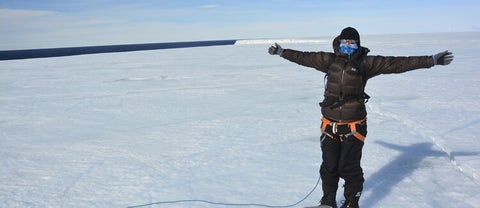Climate change is a major research focus at Waterloo, covering all aspects including policy development and analysis, physical impacts of climate change, as well as mitigation and adaptation more broadly. Some of our faculty have been involved with climate change research since the 1980s and several have worked with the Intergovernmental Panel on Climate Change (IPCC) as contributing authors or expert reviewers over the past 15 years.
GEM professors who conduct research in this area include:
- Sarah Burch:
- Governing responses to climate change (both adaptation and mitigation) in urban spaces
- Exploring triggers of transitions toward more sustainable development pathways, and strategies for engaging a variety of actors in conversations about desirable futures
- Brent Doberstein:
- Resource and environmental management in developing countries.
- Christine Dow:
- Glacier hydrology and ice dynamics using methods including numerical modeling and insitu data collection
- Ice sheets and valley glaciers
- Assessing the impact of a warming climate on global ice masses
- Claude Duguay:
- Extraction of geophysical parameters from optical and microwave imagery
- Development and improvement of numerical ice growth and heat transfer models
- Climate variability and change using lake ice and snow as indicators
- Susan Elliot:
- Medical geography, with primary research foci in the area of environment and health, the global environment, urban social geography, and philosophy and method in the social sciences.
- Chris Fletcher:
- Climate modelling, impact of climate change on atmospheric circulation patterns over Canada, the U.S. and Europe, on timescales ranging from seasons to decades.
- Richard Kelly:
- Remote sensing of the cryosphere, especially snow and ice environments, using ground, aircraft and satellite earth observation data.
- Merrin Macrae:
- Biogeochemical cycling in natural and impacted systems (agriculture, wetlands, forest) under variable climatic regimes and following disturbance or land use change.
- Richard Petrone:
- Developing a further understanding of soil – vegetation – atmosphere interactions, especially as influenced by hydrologic and climatic conditions.
- Derek Robinson:
- Land use, land management, and the carbon cycle
- Agent-based modelling as an approach to integrate GIS, ecological, and human decision-making models to evaluate socio-economic contexts and policy scenarios on changes to land use and land cover, ecological function and the provision of ecosystem services, and human well-being.
- Michelle Rutty
- Tourism and environmental change
- Virtual Reality (VR) to advance sustainability and climate action
- Steffanie Scott:
- ways of knowing and being to reconnect with the web of life, each other, and ourselves
- nature connection, relational education, learning from the land / place-based learning
- contemplative and embodied practices (e.g., learning circles)
- community food systems, agroecology, regenerative agriculture
- Daniel Scott:
- Climate change impacts and adaptation, in particular the effects of climate change on tourism and recreation
- Protected areas and biodiversity conservation
- Johanna Wandel:
- Human dimensions of global change
- Adaptation to climate change
- Vulnerability
- Drought management
- Agriculture and climate change




